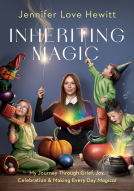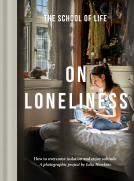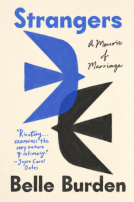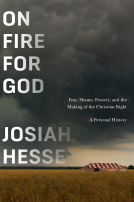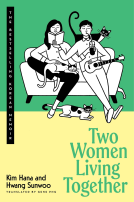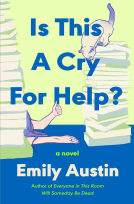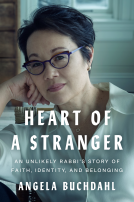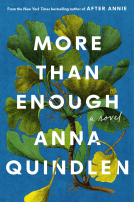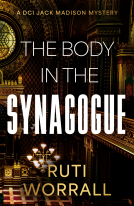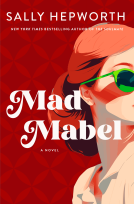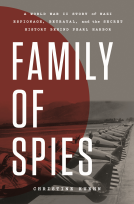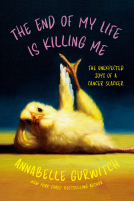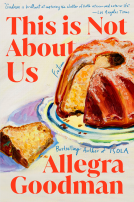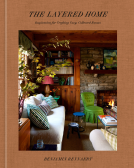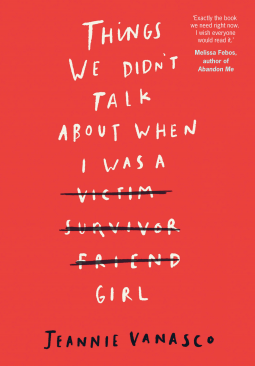
Things We Didn't Talk About When I Was a Girl
by Jeannie Vanasco
This title was previously available on NetGalley and is now archived.
Send NetGalley books directly to your Kindle or Kindle app
1
To read on a Kindle or Kindle app, please add kindle@netgalley.com as an approved email address to receive files in your Amazon account. Click here for step-by-step instructions.
2
Also find your Kindle email address within your Amazon account, and enter it here.
Pub Date Oct 03 2019 | Archive Date Oct 14 2019
Prelude Books | Duckworth
Talking about this book? Use #ThingsWeDidntTalkAboutWhenIwasAgirl #NetGalley. More hashtag tips!
Description
Why would a good person commit a terrible act?
Fifteen years ago, Jeannie’s relationship with a close friend ended in rape. With the rise of the #MeToo movement, recurring nightmares of the event that plagued her as a girl have returned. To process her conflicted feelings of betrayal and take back control, she resolves to face her trauma head-on by interviewing her rapist.
Through their transcribed conversations and discussions with her closest friends, Jeannie's compelling memoir explores how the incident impacted both of their lives, while examining the culture and language surrounding sexual assault and rape.
Things We Didn’t Talk About When I Was a Girl is a necessary contribution to the wider conversation around sexual violence from a brave, new voice.
Advance Praise
'Vanasco has written exactly the book we need right now. I wish everyone would read it.’ Melissa Febos, author of Abandon Me
'Explodes rape culture at the level of language, shows us how we are trapped and how we might make ourselves free. This is a brilliant book, an astonishingly fierce inquiry into the places language won't go.’ Emily Geminder, author of Dead Girls
'Brave and compelling… Vanasco muddles through the silt of her thoughts to create a language for something we don’t talk about.' The Paris Review, staff pick
'With deep self-consciousness, courage, and nuance, the author reveals the inner universe of her survivorship... An extraordinarily brave work of self- and cultural reflection.' Kirkus Reviews
'A powerful memoir... a painful reminder of the ugly ways some men treat women, and Vanasco’s nuanced story will resonate with those who’ve endured sexual inappropriateness in any form.' Publishers Weekly
'Cuts through the silence of deep betrayal, gives contour to the aching space between forgiveness and absolution, and offers a living testament to the endless wreckage of sexual assault.’ Amy Jo Burns, author of Cinderland
Available Editions
| EDITION | Ebook |
| ISBN | 9780715653760 |
| PRICE | $8.99 (USD) |
Links
Average rating from 52 members
Featured Reviews
 Kate H, Reviewer
Kate H, Reviewer
This was brilliant, everyone needs to read this book, especially women, but then again, especially men. The style was different to what I expected but it thoroughly suited the memoir. The book alternates between Jeannie's discussions with her friends and family about writing the book and her feelings and thoughts that she's going through and her transcribing the phone calls she has with Mark, her rapist. The chapters are titled based on a phrase from the upcoming chapter, often in relation to contents from the previous chapter.
*Disclaimer: The book, and I, have no intention to diminish the fact that men can be assaulted by women - that anyone of any gender can be assaulted by a person of any gender - we are just using these pronouns and generalisations because those are the ones relevant to the story.*
We learn more about Jeannie as the memoir progresses, and about her numerous sexual assaults. She is unflinching in her tellings of these stories, her experiences with mania and depression, and all the women that she knows that have been assaulted.
The reason I think all women should read this is because it really challenged a number of notions I held. Not only the idea that 'the rapist is a bad guy', although to be fair my own experience is certainly more nuanced than that. But it also challenges my internalised misogyny and 'performance of gender'. I had many of the same reactions as Jeannie 'oh that was nice of him', 'of course she would be grateful to him', until her friends called her out on it. Then she, and I, realised how accommodating she was being, how she was giving him the power, trying to keep the men in her life happy or help them.
I appreciated her growth to being able to take more control of the situation; of their conversations. I hope I also grew, at least to be more aware of when I'm being unnecessarily accommodating, through reading this book. I can see why she was concerned that many women reading this might have been angered by her giving her rapist a voice but I certainly didn't feel that way. Because in the end, it was still Jeannie's story, maybe not the story she anticipated writing, but one worth reading.
I think all men should read this because they need to know just how many women have been assaulted. Even I was surprised just how many women Jeannie knew who had been assaulted. They also need to know the definition of assault and rape and know how it affects women in so many different ways. I think all men, from those who have assaulted women, those who might, and those who would never can stand to be better informed.
We need more stories from 'regular' women. As was vaguely discussed near the beginning, it's one thing when it's directors assaulting models - it's not that it's not terrible, but it's harder to process because it's not necessarily a woman who you could know. But Jeannie is a woman you could know, she was a woman Mark did know - and assaulted anyway. And Mark is a man you could know - I don't want to say you should always be afraid of all men, but be cautious.
 Tara O, Reviewer
Tara O, Reviewer
This is a powerful and unflinching memoir dealing with the author’s experience of being raped by one of her closest high school friends. It is unusually and bravely written, because Vanasco writes the novel at the same time as she begins to untangle the story of what happened, so there are passages where the reader feels they are discovering things alongside her. When she began writing the book, Vanasco took the bold step of reaching out to the man who had raped her and asking him to be interviewed about what happened from his point of view. A lot of the book is taken up with lengthy transcripts of their conversations as she attempts to unpack his understanding of what happened that night and since, to explore the dynamics of the friendship they once had, and to better understand her own need to behave in a certain way around him.
 Reviewer 385311
Reviewer 385311
This book should be mandatory reading. These conversations are necessary and important and while I may not ever have the desire to talk to those that assaulted me about the assault, I gained some catharsis and understanding from this.
 Reviewer 238609
Reviewer 238609
This is a book that needs to be read. It isn't like any memoir on sexual assault I've read. The author interviews the man, who used to be her friend, that assaulted her. She gets his feelings and tells hers as well. I think the author was very brave to write this memoir. Highly recommend.
I would like to thank Netgalley and the publisher for providing me with a copy free of charge. This is my honest and unbiased opinion of it.
 Reviewer 501400
Reviewer 501400
Oof. I suspected this would be great but it packs more of a punch than I even expected - Vanasco, a woman in her early 30s and teacher of memoir writing at a university, decides to get back in touch with her rapist, a guy she was close friends with as a teenager until he assaulted her at a party when she was 19. The book then chronicles the process of getting back in touch with this guy ("Mark"), first through a series of phone calls and how the process of revisiting the rape and her friendship with him - while also trying to write about it - impacts upon her, building up to when she decides to travel to meet him and interview him face to face.
Jeannie decides to record the phone calls, allowing for a level of self-analysis/reflection as well as being able to go over and really think about what Mark says during these conversations. She quickly realises that she is trying to reassure and comfort Mark through the language she uses to make sure she isn't making him feel uncomfortable. The level of introspection is, I guess, expected from someone who teaching memoir writing, but I found it added so much to the narrative. Why do (some) women find it so hard to put their own feelings above those of (almost invariably) men around them? Jeannie also discusses the writing process with a number of writer friends throughout the period spanning her conversations with Mark, helping her to further pick apart and analyse her own reaction to events, as well as how Mark responds to her getting back in touch.
I found this impossible to put down and a thought-provoking read on a number of levels.
Highly recommended.
This is a memoir about a very specific event. In college, Jeannie was raped by a close friend and now as an adult she wants to tell this story. She feels that she can't do it without speaking to this friend and finding out how he feels about it. This book is partly an interview with him and examines why it happened and the impact it has had on both of them. Beautifully written, this is a tough but necessary read.
 Susan Anne B, Reviewer
Susan Anne B, Reviewer
Thanks Netgalley and the Publisher. Was not sure I would like this book but I was certainly proved wrong. I loved the style of writing and the emotion in the book. Worthy 5 stars
 Abby S, Reviewer
Abby S, Reviewer
An incredible read the author a victim of rape by a close childhood friend ,a friend she trusted both of them teens.Now adults she decides to contact him to discuss what he did to her this horrible act.A brave act a powerful raw important book,#netgalley#preludebooks.
TW: discussions of rape and sexual assault throughout
Thanks to Netgalley for providing me with an eARC of this book. All opinions and comments made here are my own.
"Don't back down, she said. Don't let them twist what you know is true"
Oof let me start by saying that my review, is in no way going to do this book justice. I implore you to read this, incredibly thought-provoking memoir.
"I'll tell him: I still have nightmares about you"
I've never read a memoir before so really wasn't sure what to expect of the writing style going in but I absolutely loved it. It enabled us to follow Jeannie on her journey as she experienced it and it made it even more heartfelt that way in my view. Just reading the premise I knew this wasn't going to be an easy read. And boy was I right. This book really packed a punch on every page and every chapter. It's uncomfortable, but not necessarily in a bad way. I think the whole basis of the book is so interesting and it's something i've never really seen explored before. Your best friend sexually assaults you; your best friend who, up until that moment, seemed like a decent and good guy. How on earth do you reconcile the person you've spent years building a friendship with to the person who could take you apart in one night. This is a question that has haunted Jeannie since her friend "Mark" attacked her, and finally, she's decided to get answers by contacting Mark and asking him why.
"why do I need his permission, anyway? I never gave mine"
I know i've said this but i'm saying it again; the way in which Jeannie writes is incredible. I really felt like she took us on the journey with her. Jeannie decides to record her conversations with Mark so that she can have the opportunity to reflect on the conversations, and whilst doing so realises that she is offering him comfort and reassurance, and that his comments appear to be trying to equate their experiences. This brought such an interesting dynamic to the book; I loved the sections where she meets with her friends and reflects with them. Because whilst this book is undoubtedly about the assault, it is also about the power of friendship and the strength that you can find in others. I just found these sections so interesting because it was the other people who offered their opinions about his language and the way in which she was diminishing her feelings for him "we were only 19" etc. Women shouldn't be made to put their feelings aside for me. Especially rapists.
"If he says yes, I won't thank him. I won't tell him that everything is OK between us. I won't comfort him. I am assuming he'll need comforting. Politeness isn't needed. You ruined everything, I'll tell him. You realise that, right? I can say everything"
This was just such a unique and stunning memoir and perspective. Jeannie is clear throughout that she doesn't want to demonize Mark, and she doesn't. She recalls a large range of good memories that she shared with him, and in doing so, is trying to discover whether that one destroying night overpowers the rest of their friendship. Jeannie spends a large portion of the book trying to wrestle with whether she can call what happened to her 'rape' and again this is such an interesting perspective, and one you see over and over in articles and reports. I'm glad the law changed, it was about time.
"and then the way they talked about women: It could have been my daughter or my wife or my mother or my sister. It's like, you don't have to connect this to women in relation to you. A woman can be a woman"
Although this book mostly focuses on her experience with Mark she also explores the previous occasions where she has been sexually assaulted; as a child and as an adult, and explores her feelings in how she can class previous occasions as sexual assault, but struggles with the incident with Mark.
"Don't worry about protecting the guy who assaulted you. Don't worry about the feelings of the guy's family or friends. Your job is not to protect them. He screwed up. He messed up those relationships, not you. And yet, here I am, not talking to Mark's family. Part of that is fourteen years have passed. Part of that is it'd be so much work. It's so much work to come forward. And yet a lot of people blame the victims for not reporting sexual assault, as if it's entirely their responsibility to rid the world of rapists"
I highlighted so many sections of this book. It is such a powerful read overall and is really well-written by Jeannie. This is such a unique read and I would love to read her other book because I just became entranced by her writing style; there wasn't anything I didn't like about it. She takes you on the journey of her throughout processes throughout the book. I really really recommend this book, and I will be desperately seeking out a physical copy when it comes out.
It is unflinching, uncomfortable, honest, and powerful.
 Reviewer 485727
Reviewer 485727
I was lucky enough to get an advanced reading copy of Things We Didn’t Talk About When I was a Girl by Jeannie Vanasco. While this memoir is a little different from the others I’ve been reading, it truly is fantastic. In it, Vanasco recounts the sexual assaults she’s experienced while also analysing rape culture. It is a truly amazing book and I highly recommend that everyone reads it. Honestly, it is so important. (It releases October 1st, 2019.)
What has struck me in particular about Vanasco’s memoir is how personal and honest it is. When writing about another person, there's always the risk of repercussions. Vanasco gets around this beautifully in her memoir, writing it as she seeks permission from those she talks about, and gives us their exact words. She also tells readers how her memories may not be reliable — but that the memories of those she speaks to also will not be reliable. Her book feels entirely honest and brave for that reason.
The book itself alternates between Vanasco's narrative to us and a transcription of two different phone calls that she has with her rapist, many years after the rape occurred. It's written in 'real time' as Vanasco transcribes the phone calls, and so we see her pauses and breaks and what she thinks about, and who else she speaks to.
What makes this memoir different to others about sexual assault though is Vanasco's attitude toward her rapist and her ongoing struggle to feel the anger she expects she should feel. She and Mark were very good friends for years before the rape, and so she frames her memoir as an investigation of how a good person can do something bad.
This book doesn't only look at sexual assault and the power in that though. It looks at how power is inscribed in language too, and how different ideologies are constructed on the basis of power and exchanges. Vanasco delves deeply into these ideas as she talks with her friend who's a gender studies lecturer, and the conversations recounted are fascinating and enlightening.
This is a hugely important book--possibly the most important book I've ever read--and I highly suggest that everyone reads it.
Thank you to NetGalley and the publisher for providing me with a review copy.
 Morgan S, Reviewer
Morgan S, Reviewer
I received an advanced reader’s copy in exchange for an honest review
YIKES this was hard to read. It takes you through every re-traumatizing internalization of rape culture thought process, which is actually even more painful than reading through details of the physical act of rape, and puts you right back in that head space of a scared girl who doesn’t know how she’s allowed to feel. Small doses required. And lots of self-care. And a cleansing hot bath.
 Reviewer 392033
Reviewer 392033
This is a deeply interesting concept bought to life through the lens of feminism, questioning how we expect women to act when they are assaulted. The author reaches out to the man who raped her, her once best friend, and asks him to participate in conversations that she can consider as part of a book. He agrees, and what follows are transcriptions of those conversations, melded together with the author's fears, regrets, self doubt and embarrassment at what she views to be her failings in communicating with him. This makes for hard, but very interesting reading, The author has gone where few have gone before. Her story, and her deep consideration of what it means for those who assault and those who are assaulted, are vital to our considerations of how the world of sexual assault operates.
Thanks to NetGalley for an early copy of the book for review.
I've sat and stared at the review page a few times now; I finished it a week ago and I still can't find the words to say how I feel about this book. I think it's because it's not a "normal" book for review. I can't exactly say I enjoyed the book; I don't think it's possible to use that word when reviewing a book that processes a woman's experience of rape. That said, the book obviously meant something to me because I wouldn't give it 5 stars otherwise.
But this battle with language is something that author Jeannie Vanasco constantly faces in her writing. For years, she has said she was sexually assaulted; it was only doing research for this book that she realised she had to call it rape. Similarly, she knows she should not be comforting "Mark" because of what he did to her, but years of friendship means that her language is almost always one of comfort than of distance.
Language is not the only thing Vanasco has to battle against. Many internal conflicts tear her apart, but so does a duty to a larger goal. In an era of #MeToo and women getting to tell their story, Vansco offers her own version of her story - or, rather, her rapist's version. The initial premise of the book comes from wanting to tell a story that isn't often heard, where the memories of one moment are clouded by years of friendship, and, to add extra depth to this, she chooses to include this man's POV. However, she is plagued by the fact that she is giving a man a voice in a world that has typically stolen women's - she worries about how feminist it is to include him, what that's suggesting to the larger community that her story means.
Vanasco is rarely content with her writing, unaware that the book she writes is an important, feminist masterpiece.
I completely identified with the author throughout this memoir. So much of her experience resonates with me. There are so many things to consider when going public with any reports of sexual assault, in all its many guises. And it's often not the men who crush you most. It's the women who say "well, nothing like that's ever happened to me". If, in fact, it has "happened to you" more than once, it silences you; belittles you; makes you feel even more displaced than you already do. I thank Jeannie Vanasco for unashamedly telling her story. For having the courage not only to speak out, but to admit that often it's not quite so simple as hating the perpetrator. There are so many grey areas that we never acknowledge. For me, this is what makes this work stand out. It makes me want to punch the air. It makes me feel (finally) seen and heard. When someone betrays you by way of sexual assault, all of the feelings you previously had for them don't dissipate into the ether. It's not as simple as unaffected people want it to be and that is why we need this book. We need to stop teaching girls how not to be sexually assaulted and start teaching boys not to do it. Sounds simple because it is, yet here we are. Read this book, think about it, pass it on.
‘Things we didn’t talk about when I was a girl’ is infuriating. It’s sort of a memoir with some journalist qualities, written by Jeannie Vanasco, and it’s written beautifully. The fury comes from her descriptions, her examinations of her encounters with men which have involved, or ended with, sexual assault. It’s the stories from her friends and students (she’s a lecturer in creative writing: memoir) of their encounters with men which have involved, included or ended in sexual assault.
Unwanted contact, intrusive conversations, a refusal to listen to the clear signals, all the way to rape, either penetration with fingers or penis. All of them resulting in the woman involved feeling violation, shame, humiliation.
Vanasco’s focussed one particular sexual assault - that from her ‘friend’ at high school. She had been drinking and he and another friend carried her to the basement to sleep it off. Except her ‘friend’ assaulted her instead. He raped her and while he was doing that and she was sobbing, he told her she was dreaming. The worst thing about that is that I know every woman has a similar story to tell.
This specific assault is discussed in a detached way for some, if not most of the book, while Vanasco examines different perspectives and almost seems to ‘try on’ emotions for size, wondering aloud why she isn’t angrier. I thought that was really interesting - the dissection of how she’s feeling, and how she feels in relation to her attacker. He dropped out of her life soon enough after that, but they did remain friends, at least for long enough for her college boyfriend to meet and dislike him. The lens is through the #meToo movement, as Jeannie worries that her story is too like the others and will be lost among the throng. I hope it isn’t, and I don’t think it will be, mainly because I think everyone’s stories need to be heard but also this is a different enough view, almost scientific, to stand apart.
Quite a lot of chapters are spent discussing how he feels, the impact it had (or didn’t have) on his life, via the means of telephone calls and other communication channels. These are transcribed by Vanasco and critiqued by her and her friends, also writers. I found myself rooting for her, shouting at her for apologising (!) for taking up his time, nodding along when he said he was hurt too, or drunk as well. Thankfully, her friends speak for me and a discussion takes place around his feelings,how important his perspective is and so on.
I fear that it may reach only the women who recognise and feel what she feels though - for maximum impact it needs to reach the attackers and would be rapists of society, the ones who gauge their self worth on how many women they’ve assaulted, who see women as objects to be owned, dominated and bent to their will or else. Please, if you have that guy in your friend group (or heck, if you ARE that guy), read this/get him to read this book. He might start to understand what impact that 30 second encounter has for the woman on the receiving end.
This book was incredibly interesting. How often do survivors of sexual assault get to, or more would even want to, have the perpetrator willingly be interviewed about the experience. Jeannie's story had me intrigued. This book was captivating and real.
The whole choice to write a story in which you are giving a voice to the perpetrator is something I have never seen done before. The factors involved in Jeannie's sexual assault makes for a case that I haven't seen talked about, as she mentions. It's a new side to the #MeToo movement.
In my opinion, Mark doesn't deserve to be able to share his experience of the assault. In my mind, no matter how much she tried to validate and humanise him, Mark is still a monster to me. Maybe that means that I didn't understand the book, despite this I was invested and I wanted to keep reading. But I hated Mark, I hated the way he felt the need to equalise their experiences as though he was the victim in the scenario. Sorry Buster, but you're the only one in the situation that raped someone. Your experiences are not equal.
The format of the story follows the conversations that Jeannie has with Mark, intertwined with her experiences of life following the sexual assault. At times I found the format hard to follow, especially in the transcribed conversations, in which I'd have to flip back to the last segment to remember what was last spoken between them.
The content is hard to digest in terms of feeling the anger and overwhelming emotions because it's made glaringly clear that Jeannie's experience is not a rare occurrence. At one point in the book Jeannie mentions that whenever she meets a man one of her first thoughts are 'has he ever sexually assaulted someone?'. Her mentions of her students that write about and disclose their own experiences of sexual assault. It makes you reflect on your own life and the people that you know. Has someone I know sexually assaulted someone? Has someone I know been a victim of sexual assault?
I admire Jeannie, and I love that she was surrounded by so much support in the process of writing this book. I loved that people thought she was brave, I love that people were interested. Because I was enthralled with her life. The supportive women that Jeannie has in her life is exactly the type of feminist shit that I live for.
Jeannie's story is going to make a difference in people's lives. And I am glad that I took the time to read her memoir and learn about her experience.
Thank you Prelude Books for sending me a copy to read!
 Elizabeth Ann S, Reviewer
Elizabeth Ann S, Reviewer
This is a book which is particularly relevant today when so many women feel empowered to speak out following the 'Me Too' campaign. It is a well written powerful memoir and will resonate with many women and for Jeannie obviously a cathartic exercise. It is tough reading but nonetheless an honest thought provoking book on a difficult subject. My only criticism is that it is rather over long and meandering in place but it is not a deterrent.
 Reviewer 598769
Reviewer 598769
Not so much a book as a book about a book. Most of the wordcount is spent on Vanasco wrestling with questions of authorship: how to frame the story, how to portray her rapist, how to portray herself, whether she's using writing techniques to hide from the truth.
This approach will probably frustrate anyone hoping for cathartic fury, but it's the right means to her ends. Vanasco's book isn't really about rape so much as it's about living with trauma, about how we rewrite narratives when our world falls apart. A difficult but unforgettable read.
This was a fascinating, if depressing, book.
Jeannie is a creative writing lecturer who specialises in memoir writing. She recounts a number of students who tell her stories of rape. Some of those have ended badly. But all of them share the common experience of someone taking away an individual’s right to control what happens to them.
There’s no doubt this is a book that will strike a chord with many readers. Some will feel anger, others will empathise...but, I imagine all will feel a sense of amazement at the way this experience is recounted.
We follow Jeannie through a very unusual experience. She decides to write about the man who raped her fourteen years ago. At the time he was a good friend, but they’ve not really spoken since. He is not the only person to have assaulted Jeannie, and he wasn’t the first, but she gets in touch with him to try and talk to him about the experience.
The story itself was not one you’d expect to find pleasant reading, but I was absorbed to follow her process as she creates this book. Sometimes the narrative felt muddled, yet this reflected the subject/feelings with which she was struggling.
I’m still undecided how I feel about the perpetrator of this crime, or her decision to engage with him. However, reading about her experience and the way she/those close to her respond to this was compelling stuff. There’s no easy way to view such crimes when we see who might do such things/see how common it seems to be, but it certainly stops such things being swept under the carpet and blaming victims for their experience.
Thank you to NetGalley for granting me access to this prior to publication.
A tough subject with a very honest real outcome. I don’t know if I could have been that brave or strong to look at never mind have a conversation with anyone who would have attacked me.
Outstanding writing.
Thank you to both NetGalley and Prelude Books for giving me the opportunity to read this book in exchange for my review
 Eloise B, Reviewer
Eloise B, Reviewer
A brilliant thought-provoking book centring a woman getting back in touch with her rapist.
Told in a brilliantly unique way - we follow Jeannie as she begins to write her book, flesh out the facts and come face to face with her dearest childhood friend, who just so happens to be her rapist.
I laughed, I cried, I studied my relationship with men and analyzed my own relationship with abuse.
This was a brilliant read. I would recommend to everyone.
Things We Didn’t Talk About When I Was Girl is definitely the most thought provoking book I have read this year.. Jeannie Vanasco is extremely brave write a memoir that leads her to getting back in contact with one of her best friends who raped her.
The book is unlike anything I’ve ever read before and challenged what I thought I knew about victims of sexual assault.. It shows that no two experiences are the same and that the feeling that victim have after the event can be extremely complicated. It highlights the blame culture that is sometimes associated with victims and Jeannie herself constantly worries that she’s not angry enough and constantly seems to forgive and accept her rapists behaviour and comments,
The format of the book was also interesting as much of it was transcripts between Jeannie and her rapist. These conversations and the dialogue where Jeannie then analysed these conversations was quite repetitive but I felt it emphasised that no amount of talking could take away what has happened and her experiences.
This is not an easy beach read and I did find that it took me a little longer to read it than I would usually, however, it is definitely worth a read and I would recommend it to anyone who was interested in the #METOO movement and giving the victims of sexual assault a platform to share their experiences.
This is an incredibly hard review to write. You see, on the one hand I absolutely loved this book but on the other, I know that this won't be for everybody.
This chronicles the author's attempt at reaching out to the friend who sexually abused her in the past. And with that comes a lot of triggering content that I don't know many will be able to cope with.
I myself had to put the book down many times, not because of the description of the actual assault but because of everything that came with it that felt all too familiar - the shame, the guilt, the confusion. Because it wasn't some stranger in a dark alley that took advantage of this author, but a friend. Someone she trusted.
And it's harrowing listening to his side of the story in this novel, especially since there are times when he is manipulating the answer and other times where he openly admits to the assault.
It's a very hard book to read and rate.
But if you feel comfortable going into this book and experiencing such a story, I encourage you to do it. It is in part cathartic, or at least that's what it felt like to me.
Definitely heartbreaking but also a testament to the fact that we are not meant to be victims forever. We are survivors.
A stellar book idea and overall so necessary in this world where everything is painted black and white when really, most of what women feel when it comes to this issue is the gray.
 Nicola S, Reviewer
Nicola S, Reviewer
This book was hard hitting and I comfortable to read as it’s based on being sexually assaulted and raped.
Thought provoking and interesting and the author has so much strength to write this and share her story.
 Amanda W, Reviewer
Amanda W, Reviewer
This is a haunting and powerful memoir of a young girls traumatic sexual assault by a close friend when she was just 14, which will stay with me for a long time.
A raw, brave and thought provoking read. 5 stars
I wasn't aware this was about the author until I started to read but this made it all the more stark and shocking. There are so many themes to make note of, that this is not just about confronting a rapist years later but about moving on and confronting your own behaviour towards other people. Fascinating stuff.
Readers who liked this book also liked:
Jennifer Love Hewitt
Biographies & Memoirs, Nonfiction (Adult), Parenting, Families, Relationships
Kim Hana; Hwang Sunwoo
Biographies & Memoirs, Nonfiction (Adult), Parenting, Families, Relationships
Annabelle Gurwitch
Biographies & Memoirs, Health, Mind & Body, Humor & Satire
Benjamin Reynaert
Arts & Photography, Home & Garden, Reference

